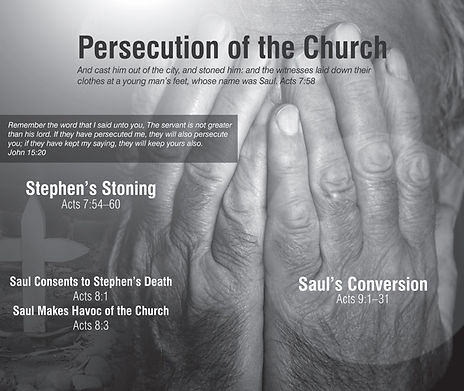

Bible Study Week 10
Part 2

Persecution of the Church
Stephen
In Acts 6, the church was increasing so rapidly that the apostles recognized the value of sharing responsibilities. They could not do the relief work and still spend adequate time and preaching and teaching of the Word of God. Seven men were chosen to lighten the load of the apostles. One of these men was Stephen.
Stephen's Qualifications (Acts 6:8)
Stephen was "full of faith and power". He not only did the specific job God had given him, but he looked for other opportunities to serve. God can always use someone who has this kind of outlook. Stephen's work was so outstanding that he was picked as a target by the enemies of the rapidly growing church.
Stephen on Trial (Acts 6:10)
Stephen's opponents were no match for his wisdom and spirit. They tried physical force to get rid of him. They hired men to bear false witness against Stephen. Stephen was placed on trial before the Sanhedrin (the Jewish body of elders).
Stephen Preaches and Dies (Acts 6:12-13)
Men testified falsely against Stephen's conduct, but they could not change his character. The Jewish leaders were greatly alarmed when they beheld his face shining as an angel as he preached to them with a holy boldness. He delivered his sermon to them about the way God had dealt with Israel throughout the Old Testament. He preached, truths they could not contradict, finishing up by proclaiming that his listeners had betrayed and slain the Son of God. In anger they cast him out of the city and stoned him to death. With the murder of Stephen, the persecutors of the church shed the blood of the first of many Christian martyrs.
One of the leaders of the subsequent persecution was Saul of Tarsus, who was a witness of and gave consent to Stephen's death. A wise man has appropriately said, "They tried to stamp the fire of God out in Jerusalem, but they spread the embers all over the world". As a result of the persecution, the truth spread into all Judea and Samaria and into all the world.
Saul
Acts 9 describes the conversion of Saul, who was also known as Paul. He is a key figure in much of the New Testament.Saul was a devout Pharisee and a persecutor of the church. By the power of God, he became a powerful apostle and preacher to the Gentiles.
The conversion of Saul was so unlikely that a British agnostic of the last century thought it would not be difficult to disprove. By so doing he thought he could show the rest of the New Testament to be unworthy of any credibility. George Lyttleton wanted to show how impossible it would have been for a man like Saul to change so drastically. He put the results of his studies in a book titled Observations on the Conversion and Apostleship of Saint Paul. His amazing conclusion? "Paul's conversion and apostleship alone, duly considered, is a demonstration sufficient to prove Christianity to be a divine revelation".
Saul the Persecutor
When the Sanhedrin had Stephen stoned, Saul was in agreement with their actions. He launched and all-out persecution of the church (Acts 8:3). He obtained letters of extradition from high priest against the Christians in Damascus.
Saul on the Damascus Road
On the way to the city of Damascus, a bright light from heaven shone round about him. Then he heard a voice asking, "Saul, Saul, why persecutes thou me?" All sorts of inadequate explanations have been given to explain away what really happened. But the conversion of Paul cannot be accounted for except by Paul's own description of the change in him. He met Jesus and was fully persuaded to surrender. He had a personal encounter with God.
Paul answered Jesus by saying, "Who art thou, Lord?" When Jesus answered, "I am Jesus whom thou persecutes". Paul was convinced. His reply was, "What wilt thou have me do?" (Acts 9:5-6)
It is important to ask God, What will you have me do? This question will save a person from many unproductive, failing years. Saul asked this question immediately upon contact with God. His life was never the same after the encounter with Jesus on the Damascus road.
Saul Receives His Sight (Acts 9:18)
Saul was blinded by what he saw. He was led to Damascus, where the Lord sent him further instructions, telling him he would find help there. After Saul prayed and fasted for three days, the Lord sent a man with a message for him. A disciple named Ananias visited Saul, laid hands on him, and prayed. Immediately Saul received his sight and was filled with the Holy Ghost and Ananias baptized him. Saul received both physical and spiritual sight that day (Acts 9:18).
Paul wasted no time in getting busy with the Lord's work. He began witnessing immediately. A conversion like Paul's makes for an exciting and dramatic testimony. Of course, most people come to God without a vision or a spectacular ordeal, but the experience of the new birth is always a glorious transforming miracle.
>>> Why was the church persecuted? How does this relate to persecution that Christians experience today?
We can look back in history and see seasons where societies persecuted Christian believers. While we seek peace with everyone, we recognize sometimes our biblical convictions put us at odds with society. In those moments, we prayerful follow God.